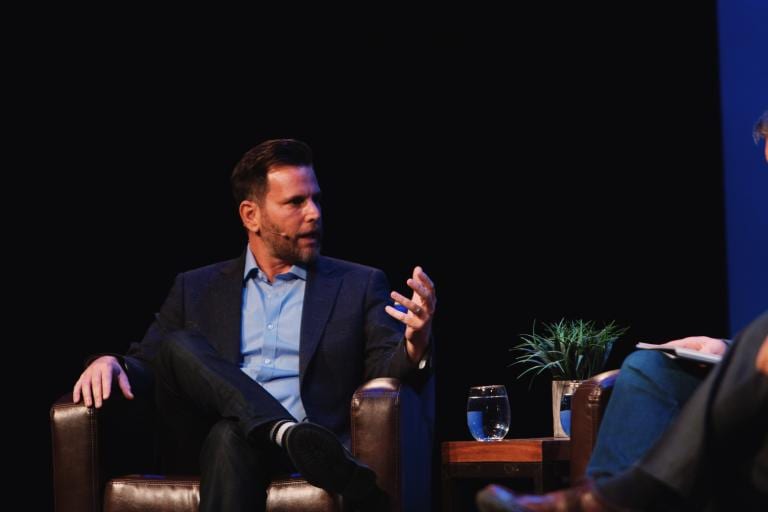
Dave Rubin is one of the bright lights of the intellectual dark web. He occupies that unique niche inhabited by the likes of Jordan Peterson and Douglas Murray, where the sacred and secular rub shoulders. Tired of living in a contentious world of non-overlapping magisteria, these men seek a parley. They aren’t puppets of a particular ideology but a curious audience who just wants to know who is really pulling the strings.
Rubin was featured in a brilliant conversation with Christian apologist John Lennox at the 2019 Unbelievable? conference in Costa Mesa, California. I was lucky enough to be in the audience during the discussion and found it to be a refreshing evening of deep respectful conversation. One of the things that struck me that evening was the admiration that Rubin had for the largely Christian assembly as well as the affection the audience felt for him.
Baptized in the Jordan
Rubin, while raised in a conservative Jewish home, considered himself a cultural Jew content to adopt the atheist label. However, things began to change during one of his yearly self-imposed technology sabbaticals when he began to realize that he was no longer an atheist.
I do this off the grid August thing where I literally lock my phone in the safe and I don’t look at any news or television; I’m completely offline and I really disappear and I try to let my brain reset. And two years ago when I did it, one of the thoughts that I kept having sort of in my peace was that: I’m not an atheist. And I came back and I said it in a very casual way, and I just did this live stream where I just sort of said it very flippantly, that I just don’t like the word atheist – it doesn’t fit what I believe. I do believe in something else, even if I can’t completely articulate what it is. I think Jordan (Peterson) has gone a long way toward articulating the type of thing that I believe in.
Rubin’s digital fast became a transcendent feast and his spiritual intimations were confirmed after being immersed in the thoughts and ideas of Jordan Peterson. Baptized in the Jordan he emerged a new man.
Jordan and I did about 110 stops in one calendar year and about 20 countries – it was pretty amazing – and when you spend that kind of time listening to a true innovative thinker – I mean, truly the guy that I think is the world’s most important public philosopher, let’s say – talking about his biblical lectures and talking about his perspective on life, and that there has to be a bedrock of something that is real and true, outside of us. And then how he relates that through the biblical stories – it moved me; it moved me over the course of the year that we did this together. So, I would say I’m secular basically in my life, but I definitely in the last year have found that there has to be something outside of us; the rest of this makes no sense.
Swabbing the Postmodern Poop Deck
Rubin already knows that a political or cultural agenda without a foundation is not only unworkable but dangerous. He recognizes that this bedrock must be outside of us because only then can we hope to find universal truth. He acknowledges that the biggest threat to foundational unity is the wrecking ball of postmodernity.
The postmodern project calls each of us to create our own purpose, live by our own rules, and do what makes us happy. It insists that we become the master of our fates, the captain of our souls. In other words, it tells us we must sail alone. The problem is that sooner or later we have to put aside our swashbuckling ways and swab the poop deck, but sadly find the task a bit daunting without a crew to help us.
I would suggest that the source of the problem is the original sin of wanting to become like God. Thinking we can create our own personal kingdom without boundaries we also end up with no citizens. We are forced to be king, handyman and chief bottle washer, which is great as long you don’t have to fix a broken faucet or clean up after a night of hard drinking. The world becomes millions of kingdoms ruled by “divine” despots who are constantly stepping across the line and gerrymandering the boundaries of their personal fiefdoms.
Theater of the Absurd
Rubin recognizes that every worldview must have a foundation and that is why he finds allies in both the atheistic and Christian communities since both believe objective truth exists. It is the postmodernists that give him heartburn, because they believe that all truth is relative. He finds it extremely difficult to have a meaningful conversation about bedrock when his interlocutor believes the world is just shifting sand.
Postmodernism reduces metanarrative to improvisation and instead of being characters in a grand drama we are reduced to comics taking suggestions from the audience. One group finds their place in the greatest story ever told while the other creates their own personal reality.
Unfortunately for our postmodern friends, improvisation just becomes a “theater of the absurd,” amusing to watch, but practically useless as a way to understand the world in which we live.
So, I’m usually much more comfortable talking about my political conversion than a religious one! But I would say this, that consistent with me talking about sort of what’s happened with the post-modern left, with the progressives – and we see this now where there’s sort of nothing that’s empirically true and any given day you can feel anything about any particular topic – there’s a reason for that. And the reason is they’ve disconnected everything; their whole worldview is disconnected to anything that came before them. So that can be God or a religious set of ideas or something like that.
Duct Tape of Tolerance
Postmodernism arose as a response to the modernist claims that truth is objective and determined scientifically. It didn’t like the idea of universal truth whether it was scientific, religious or philosophical. It bristled at the thought of science as the new sheriff in town, especially since they thought they had already demoted the previous religious and government law enforcement agencies to mere cultural safety nets designed to catch those who partied too hard. Unfortunately, postmodernism doesn’t propose any new ideas or solutions; it finds its power deconstructing old ones, basically becoming skepticism on steroids.
Postmodernism, however, encountered a problem as it wielded its wrecking ball of deconstruction: how could it hold the crumbling cultural structure together while simultaneously trying to destroy it? The answer was the flimsy duct tape of tolerance, a concept that appears quite friendly and inviting on the surface but is fraught with all sorts of difficulties. Rubin weighed in on the problem of tolerance:
Who are the most intolerant people in society right now? It’s the people that are constantly telling you how tolerant they are; that’s the irony – it’s the people that tell you you’re a bunch of racists and bigots and homophobes and the rest of it. And that’s the real bizarre flip that we have happening in society, and I think that is linked to – however you want to phrase it – either a post-Christian world or a post-Judeo-Christian world or a post-modern world, however you want to define that.
While many people accept tolerance as a kinder, gentler way of behaving, they rarely think about the ramifications of such a philosophy. Tolerance allows everything except that which it considers intolerant to exist. Its own philosophy renders itself incapable of policing its adherents and finds itself inconveniently forced to turn to the government, which it dislikes to make laws – it finds oppressive, to control behavior it ironically finds quite intolerant. The very things that postmodernists abhor – authority, rules and intolerance – are exactly the mechanisms they are forced to adopt in order to promote their agenda.
We’ve removed God from the equation and what do we get? We get government. And they now pray basically to government. They think that they can figure out somehow by sitting in a room with a bunch of other politicians and bureaucrats.
Fat Shaming Truth
Since the epistemological structure of postmodernism is incapable of supporting the weight of objective truth it has to keep it away by fat-shaming it. It doesn’t dare test the tensile strength of tolerance because it knows that it is already teetering under the overwhelming mass of its own ego.
For the postmodernist, relative truth is a wonderful thing because it is portable, lightweight and doesn’t require extra baggage fees when you travel. Nobody gets hurt when you throw your weight around because your opinion consists of nothing but hot air.
The problem, however, is that relative truth can barely support the hopes and dreams of one person let alone the family of man.
Alone in the Universe
Postmodernism has not only destroyed political, scientific, philosophical and historical foundations but has ushered in a crisis of meaning. It’s no mystery to our young people that the world is a lonely place. They know they are spiritually broken, but their schools tell them that spirit doesn’t exist. They feel a crushing darkness and then are told to light the divine spark within even though they know that it has always been a fire hazard. Told they are just molecules in motion, they turn to happy chemicals to numb them to the blind pitiless indifference of the universe.
In this digital age, our young people have unprecedented access to sexual partners, mates and friends? So why are they so lonely? The internet promised us a global village but ended up building a digital monastery. I would argue that the loneliness that plagues our young people isn’t due to a lack of personal contacts but lack of a cosmic presence. They don’t feel alone in their communities but rather feel alone in the universe.
You can play video games all day, you can do whatever it is to fill up that hole, if it’s an existential hole or a hole in belief or in whatever it is. But there are a lot of ways to fill that hole. Jordan, in my opinion, has given the best set of beliefs that take from a religious tradition and blend what I would say are Enlightenment values or basically secular values, Judeo-Christian values – and he’s blended them in the most effective way.
Ticket to Ride
While Rubin has been outspoken on political and cultural issues, he has been a bit reticent to share his personal thoughts on religion, which makes this Unbelievable? show so interesting. He clearly recognizes that the world has a problem and that problem is due to a foundation that lacks spiritual concrete.
Rubin has graciously given us a ticket to join him on his spiritual journey and while we hope that he makes Jesus the conductor we are grateful that he has let us come along for the ride.












